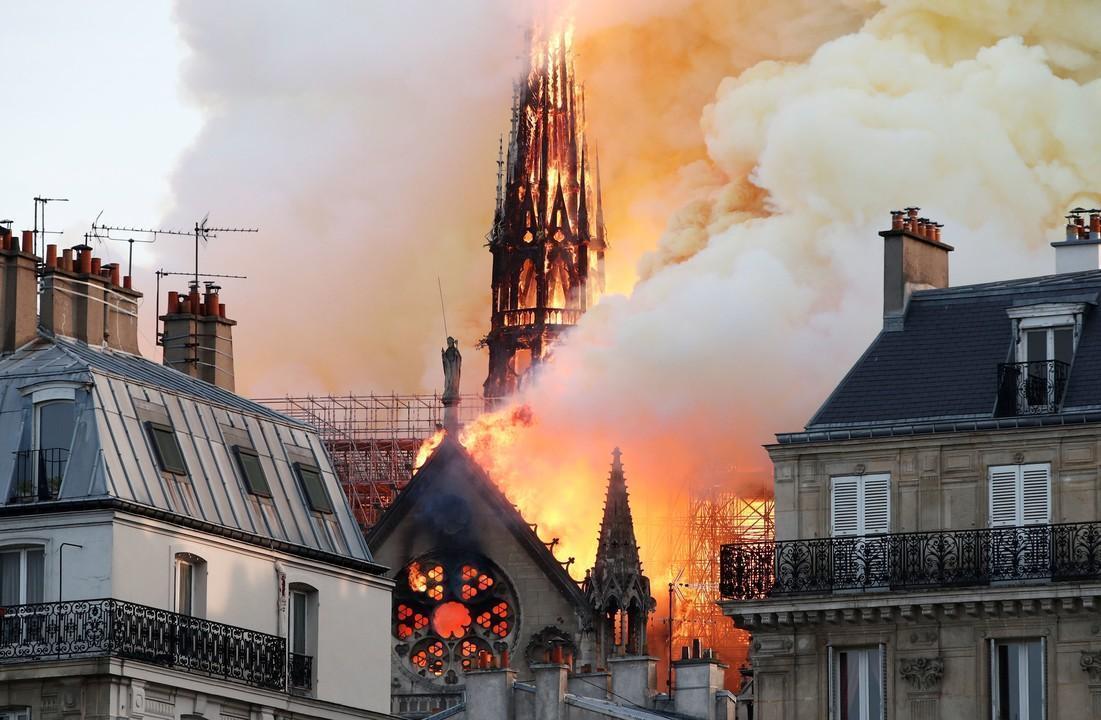Notre Dame Cathedral ignited, so far as we know, because accidents happen at construction (and reconstruction) sites. But it burned so ferociously because of a cluttered attic of flammable materials referred to as “the forest.”
Notre Dame, in other words, needed preventive medicine. Like most of us, however, it didn’t get it- or at least, not in the requisite measure. Only in the aftermath of calamity does that landmark get what seemed too hard and too costly before, though now it is much harder and costlier. Ounces of prevention, pounds of cure, indeed- for great Gothic structures, and the structure of ourselves.
My wife is French, we have family in Paris, and Notre Dame Cathedral occupies a very special place in our lives and memories. An indelible episode of our beautiful romance features me singing (badly) a Kingston Trio classic, strolling hand in hand with Catherine by Notre Dame through a soft Parisian night. Over the years since we have returned multiple times, most recently with several of our now adult children. We have long claimed Isle Saint Louis, which offers a singular view of Notre Dame- as our own special place in a city where we have walked every street, and know most nooks.
Along with the French, and the world, and in our own intimate ways, too, we are deeply saddened by the devastation of the fire. The assault of it feels…familial.
Still, I can’t help but view this through the lens of my vocation, too. I have been saddened my whole career by similar conflagrations in the lives of my patients and their families, and in the whole of public health. I have been devastated by every heart attack, stroke, amputation, and cancer diagnosis we knew fully how to prevent- but did not. We did not because the “teachable moments” that offer us Preventive Medicine specialists our greatest opportunities come all too often in the aftermath of calamity.
Much the same, it seems, is true of our native anatomy, and grandest architecture; much the same pertains from levees to lofty spires. We are ever better at crisis response than crisis avoidance, ever more inclined to put out fires than prevent them in the first place.
All of this ultimately is much about human nature. We are evolutionarily tethered to a slender range of temporal perceptions and motivations. Immediacy looms large in our gratification and priorities, as it loomed ever large in our Paleolithic survival. The great Notre Dame fire smolders in the deep crevasses of Homo sapien heuristics.
But then again, the construction of that magnificent Gothic cathedral over a span of centuries is also a product of human nature. The grandeur of Notre Dame has always proclaimed the capacity of humans to rise above the constraints of nature to make spires gracing skies. What a jarring juxtaposition: an immanent human myopia ravaged the product of human vision transcending by far the lifespan of those who owned the eyes.
There is, I hope, an invitation in this moment to do more than gather the necessary sums for salvaging an iconic confluence of history, lore, faith, reverence, and romance. There is the obligation, as others have already noted, to contrast the prominent and evocative, with the unprepossessing but profoundly important. Do we rally to the restoration of a cathedral while begrudging the requirements of our very climate? Yes, Notre Dame is centuries old; but the glaciers we are blithely melting away are grand structures of vastly deeper antiquity.
Do we contain flames, but not the flames of contagion? Do we defend the artistry of stained glass, while tolerating the stains of hunger, want, and abuse of human dignity? If we feel this particular pang in all the same ways across borders, miles, cultures, and languages- can we deny what it implies about our common humanity?
And there is the opportunity to reflect our potential for farsightedness inward, too, and do more to protect the crucial constructs of our lives- our own health, and those we love- rather than wait to rescue those after preventable disaster.
Notre Dame burned because “the forest” went unmodernized, because standard, contemporary fire safety mechanisms went uninstalled. Notre Dame burned because of human nature: our tendency to favor short-term benefit over long-term preparation; our predilection for crisis response over crisis prevention; our antipathy for current costs linked to future benefits; our discounting of the ‘non-events’ that issue from effective prevention; our perennial failure to learn from the follies of history.
But, of course, Notre Dame was built in the first place because of human nature, too: our restless aspirations; our ever-extending reach; our inexhaustible pursuit of inspiration.
In much the same way, the prowess of modern medicine- from pharmacogenomics to microsurgery- reflects the ambitions of our restive nature. The neglect of lifestyle as medicine, the tantalizing opportunity to eliminate some 80% of chronic disease and premature death we have left so long to languish- reflect an intrinsic blindness.
Perhaps through the smoke obscuring Parisian skies there is an opportunity to see more clearly the value in what never happens, and the latent promise of prevention. Perhaps in the ashes of human vision there is the chance to review what truly matters.
The bells of Notre Dame, temporarily, have been silenced; yet still they toll for thee, as for me.
Dr. David L. Katz is a proud 2019 nominee for a James Beard Foundation Award in health journalism, and author most recently of The Truth about Food. All book proceeds go to support the True Health Initiative, a federally authorized 501c3 non-profit.



Leave your comments
Post comment as a guest